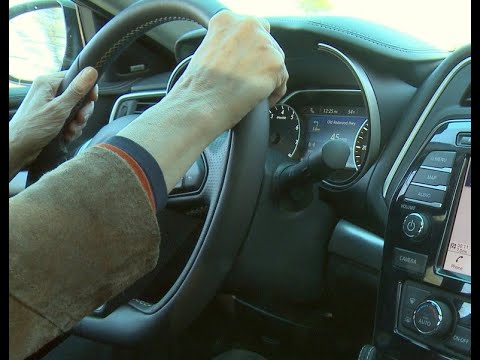National Survey Finds Passengers Who Speak Up Can Make a Huge Difference
ERIE, Pa., May 23, 2023 /PRNewswire/ — A national survey commissioned by Erie Insurance shows that passengers can dramatically help reduce texting while driving by asking the driver to stop. Almost half of drivers who were asked or told to stop texting (43%) said they stopped doing it at once and never did it again. And yet, 10% of passengers don’t speak up when a driver starts texting. Why? The majority say it’s because they wouldn’t want to offend the driver or feel it would be uncomfortable to say something.
Because speaking up can make such a big difference in stopping the dangerous behavior of texting while driving, Erie Insurance reached out to a psychology professor for tips for how passengers can overcome their discomfort with making “the ask.”
Dr. Stanislaw Kolek is a visiting assistant professor at Allegheny College whose areas of study include vulnerable road users, driver training, driving styles and hazard perception in driving. He offers four different approaches for asking a driver to stop texting while driving.
- Negotiation – This method involves acknowledging the situation and providing a solution. “If you are in a car and the driver starts texting, you could say, ‘It looks like you really need to be texting someone right now so why don’t you let me drive? I can drive and you can text, and once we get to our destination, you can get back into the driver’s seat,'” said Kolek. “It’s a way to get them to realize that the behavior is not wanted and that you’ve already come up with a solution. Asking them if you can be the driver in that situation is usually a very non-antagonistic way of getting yourself out of a dangerous situation.”
- Positive Reinforcement – Another tactic is to let the driver know how putting down their phone can benefit them. For example, Erie Insurance has a program called YourTurn, a smartphone app that enables safe drivers to earn rewards that can be used for gift cards or donated to charity. Within the first 30 days of using YourTurn, drivers have seen an average reduction of 35% in phone distractions, 20% in hard braking and 20% reduction in at-risk speeding. “Letting the driver know about a rewards program is a good approach, especially if they don’t already know about it. You can say ‘Hey, there is this app you can download and be rewarded if you just don’t use your phone while driving,'” said Kolek.
- Partnership and Mutual Accountability – This approach is like a buddy system in which two people both agree to do or not do something and hold each other accountable. It’s often used when people are trying to, for example, increase how much they exercise or change their eating habits. It can also apply to breaking the bad habit of texting while driving. “You can say, ‘If I don’t text while driving, you can also not do it, and then we can both kind of keep each other accountable,'” said Kolek. The impact of this approach can be amplified if there are also mutually beneficial rewards attached. For example, if a married couple is on the same car insurance policy, both have to drive safely in order to get the best rate.
- Negative Consequences – Creating negative consequences for the driver is another tactic, but often is used only as a last resort if other, more positive approaches fail. One negative consequence, Kolek says, is social isolation with a group. “You can say, ‘You’re the driver and I am your passenger and we’re a team right now. I really don’t want to be in the car with you while you are texting.’ That would probably be effective if the person is reasonable and wants you to continue riding with them,” said Kolek.
You can watch a video of Dr. Kolek sharing tips for how to ask a driver to stop texting while driving here.
The data about the impact of speaking up is from a survey Erie Insurance commissioned to explore the notion that for society at large to stop a negative behavior, it has to become socially unacceptable. The survey asked people not for their personal opinions, but rather how they think society as a whole views texting while driving. Almost three-quarters (73%) think it’s considered socially unacceptable – but that leaves 27% who think it’s considered socially acceptable, indicating that more progress needs to be made in terms of changing society’s views on the topic. To see more survey results and infographic, visit erieinsurance.com/distracted-driving.
About the Survey:
This survey was conducted online within the United States by The Harris Poll on behalf of Erie Insurance from January 31 – February 2, 2023, among 2,060 U.S. adults ages 18 and older. The sampling precision of Harris online polls is measured by using a Bayesian credible interval. For this study, the sample data is accurate to within +/- 2.8 percentage points using a 95% confidence level. For complete survey methodology, including weighting variables and subgroup sample sizes, please contact [email protected].
About Erie Insurance
According to A.M. Best Company, Erie Insurance Group, based in Erie, Pennsylvania, is the 11th largest homeowners insurer, 13th largest automobile insurer and 13th largest commercial lines insurer in the United States based on direct premiums written. Founded in 1925, Erie Insurance is a Fortune 500 company and the 19th largest property/casualty insurer in the United States based on total lines net premium written. Rated A+ (Superior) by A.M. Best, ERIE has more than 6 million policies in force and operates in 12 states and the District of Columbia. News releases and more information are available on ERIE’s website at www.erieinsurance.com.
SOURCE Erie Insurance Group


